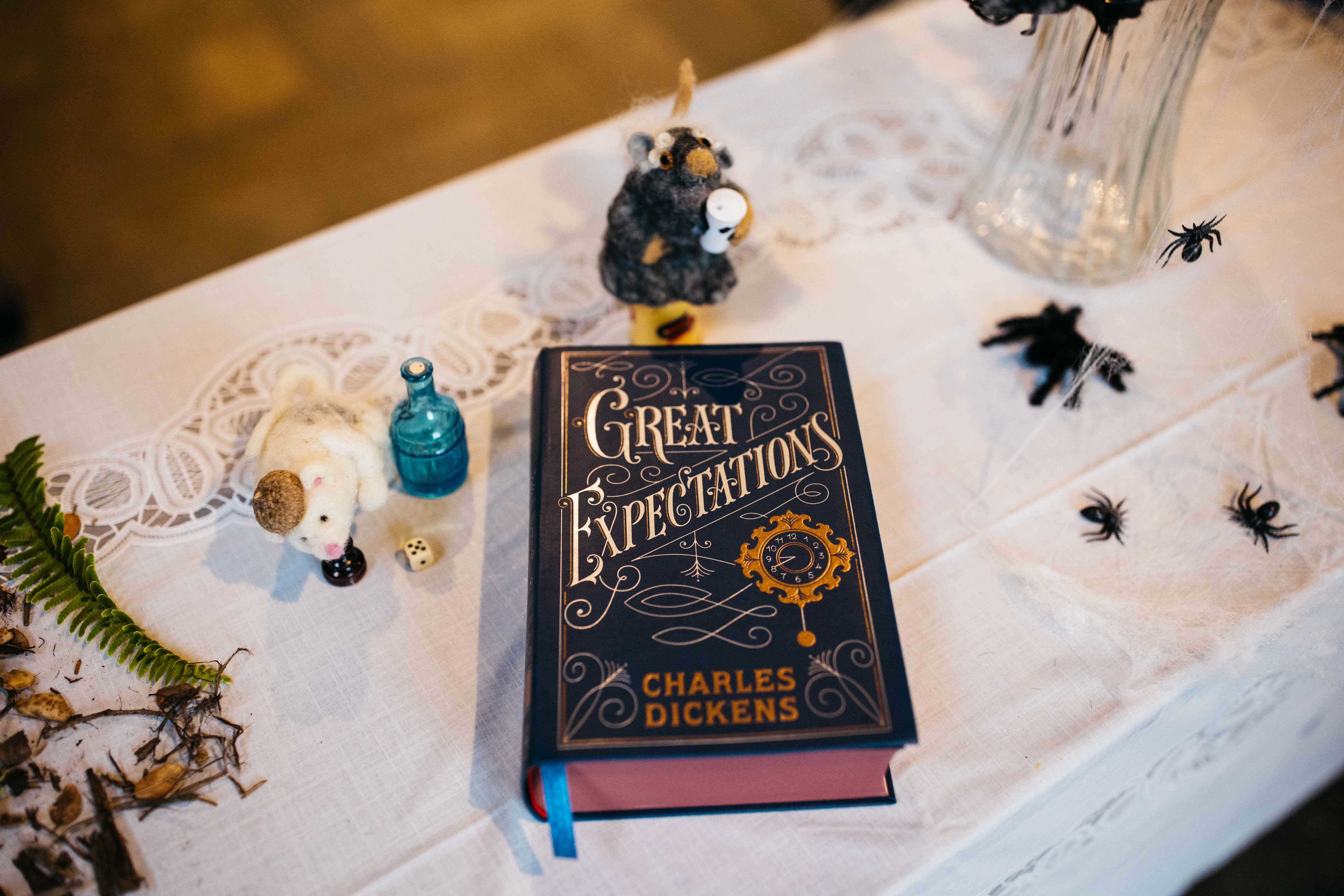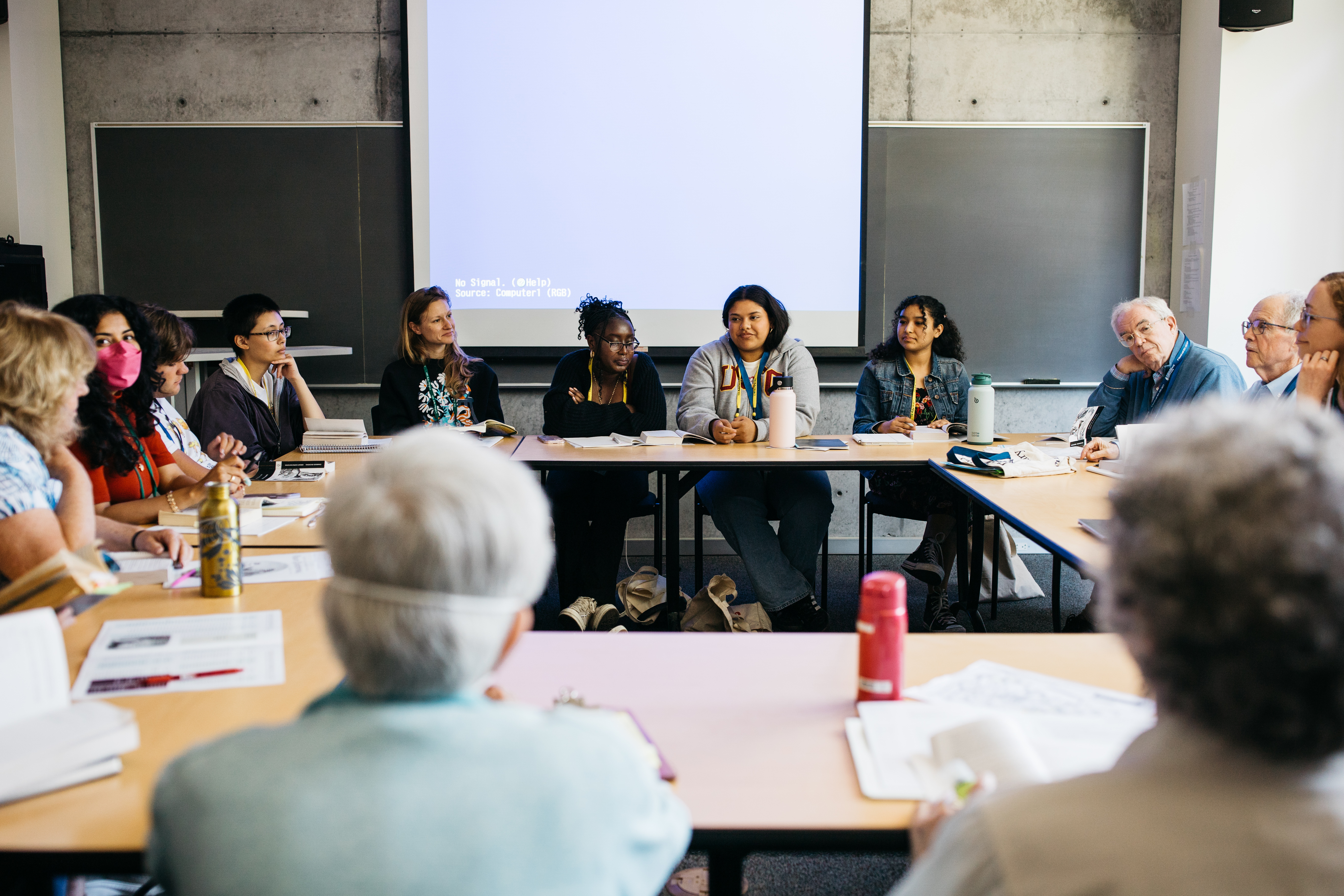The 2024 Dickens Universe, held July 21-27 at the University of California, Santa Cruz, drew 185 people to campus in addition to about 30 people on Zoom. The conference, which this year treated Great Expectations, is the 44th annual Universe. Great Expectations was the first novel explored in 1981, and it was chosen again in 1995 (paired with Jane Eyre) and in 2011.
After dinner served by the University catering service outdoors on the Stevenson Coffeehouse Patio in the pleasant weather, the 2024 discussion of the Dickens’ 1861 novel opened Sunday evening with a lecture, “Remorse,” by John Bowen of the University of York, which set the tone for several of the lectures that followed by raising questions about forgiveness and its associations (pardon, contrition, remorse) in the novel, especially the question of how much is forgiven, and by whom. There are, he said, “No great expiations” in the story.
Mornings during the week started out, after an al fresco breakfast, with groups that explored the context of the novel. The group this writer attended was led by Jim Adams of Columbia University, with attendees hailing from Brooklyn, Oregon, Kansas, Chicago, and elsewhere. After the group discussions, another lecture was presented, this one by Summer Star of San Francisco State, titled “The Problem of Forgiveness in Great Expectations.” Pip, she said, “gives Dickens the opportunity to explore the nature of conscience,” and how a conscience might be haunted. Pip’s “persistent fear of disgrace” è is life-long, and the events in the novel that promise reconciliation or confession are “questionably effective.”
After the morning lectures, attendees again broke into groups, this time with graduate students as leaders, to discuss the text itself. Lunch was served, again in the patio (the cafeteria is being remodeled), and after that people went to various afternoon events, including a Dickensian Seminar led by Christian Lehmann, talks by faculty members and other subject-matter experts, the Victorian Teas, teacher workshops, and film screenings. A video of Hannah Baumgarten’s ballet Havisham! was also screened, with Baumgarten on hand via Zoom to answer questions. The week was busy, and, as co-director John Jordan always reminds people in his introductory remarks, “Pace yourself. Don’t try to do everything.”
On Monday evening, the first round of “post-prandial potations” was held after dinner. These potations were joined by sales of the year’s T-shirt and other merchandise, including a book sale by an antiquarian book seller. The Monday evening lecture was by Elizabeth Miller of UC Davis, titled, “The Retronymic Ocean: Steam and the Recent Past in Great Expectations.” Miller’s talk introduced a new term to many in the audience: a retronym is a term created to distinguish something from its original meaning (an example is “acoustic guitar,” a term that became necessary only after the invention of electric guitars). Her talk covered the changes in the oceanic world between the time the novel was written in 1861 and the time it was set, fifty years before that. While this time would have been remembered by some of Dickens’s readers, she said, “steam was yet in its infancy,” and this era is a transitional one for seafaring. Great Expectations, she said, and the death of Magwitch in a steamer accident, registers “termination shock” in terms of the change to steam power, which presages the development of industrialization.
Tuesday morning’s lecture by Briony Wickes of Royal Holloway, University of London, was titled “Dickens’s Woolen Threads: Sheep, Settlement, and Magwitch’s Plot.” To tie these threads together, Wickes said, “requires that we pay more attention to non-human beings...Victorian animals exist away from the center, at the margins.” Yet Magwitch’s considerable fortune in Australia is built on sheep farming, and his exile “gives [him] the time to think about Pip and amass money,” Wickes said. Her fascinating talk covered both sheep in Victorian literature (Bleak House has many, she pointed out) and the history of sheep farming in both England and Australia, and how it shaped human identities.
 On Tuesday evening, long-time attendee Carolyn Oppenheim Schwarz presented co-director John Jordan with a quilt she made for him from past Universe T-shirts. (Carolyn also donated a quilt to the Friday evening auction, which sold for $1,000.) The quilt, pictured at right, remained displayed in the lecture hall for several days, and Tuesday evening’s speaker, Elaine Auyoung of the University of Minnesota, mentioned before her talk that “It is an honor to have the quilt behind me.” Her lecture, “Learning to Feel Ashamed of Home,” was not what many gathered from her title. She spoke about the current literature of academic training in reading, and tracked Pip’s learning, saying he experiences “perceptual transformation.” Her emphasis thus was on the word “learning” rather than the word “home” in her title, as Pip learns to notice “multiple things in multiple contexts.”
On Tuesday evening, long-time attendee Carolyn Oppenheim Schwarz presented co-director John Jordan with a quilt she made for him from past Universe T-shirts. (Carolyn also donated a quilt to the Friday evening auction, which sold for $1,000.) The quilt, pictured at right, remained displayed in the lecture hall for several days, and Tuesday evening’s speaker, Elaine Auyoung of the University of Minnesota, mentioned before her talk that “It is an honor to have the quilt behind me.” Her lecture, “Learning to Feel Ashamed of Home,” was not what many gathered from her title. She spoke about the current literature of academic training in reading, and tracked Pip’s learning, saying he experiences “perceptual transformation.” Her emphasis thus was on the word “learning” rather than the word “home” in her title, as Pip learns to notice “multiple things in multiple contexts.”
On Wednesday morning, Matthew Sussman of the University of Sydney spoke on “Laughter and the Dickensian Sense of Humor,” saying that Dickens was “the greatest humorist England ever produced, Shakespeare not excepted.” While Great Expectations is not often recognized as a humorous novel, he said, it deserves attention. Humor, he said, has its own history, and Victorian humor was very different from its harsher counterpart in previous centuries. In the 19th century, there was a new understanding of laughter; the term “sense of humor” was not coined until the late 18th century. Pip, he said, “learns that you can laugh at your deficiencies.”
Wednesday evening was free for people to visit downtown Santa Cruz and the beaches; Thursday morning’s lecture was “Welding Parts Together: Quixotic Seriality in Great Expectations,” by Sara Hackenberg of San Francisco State. Seriology is, she said, “the defining term of modernity.” Narrative itself is ancient, but newspapers, magazines, and serial publication in the 18th and 19th centuries created a new delivery system for narratives. “Great Expectations,” she said, “is both ordinarily and extraordinarily serial” in that is “ceaselessly begins and ends.”
Several cases of Covid cropped up during the week, confining people to their rooms, so when this writer experienced a scratchy throat on Thursday afternoon, she chose to pack up and go home, thus missing the presentation by Lura Johnson, Resident Pianist of the Baltimore Symphony and Principal Pianist of the Delaware Symphony, and Jason Rudy of the University of Maryland. The Grand Party, hosted by Sandy Bieler and her team, was held after the presentation, and Friday saw a repeat of all activities, with the Friday morning lecture, the Herbert Furse Memorial Lecture, delivered by Rosemarie Bodenheimer of Boston College: “At a Loss in Dickens.” The week ended with the Victorian Dance, for which attendees dress up and dance to Victorian music. Friday evening also saw the annual fundraising auction and the announcement of next year’s novel, which will be The Old Curiosity Shop. Dates for the 2025 conference will be announced after the start of the year. Go to https://dickens.ucsc.edu/universe/ for more information.

